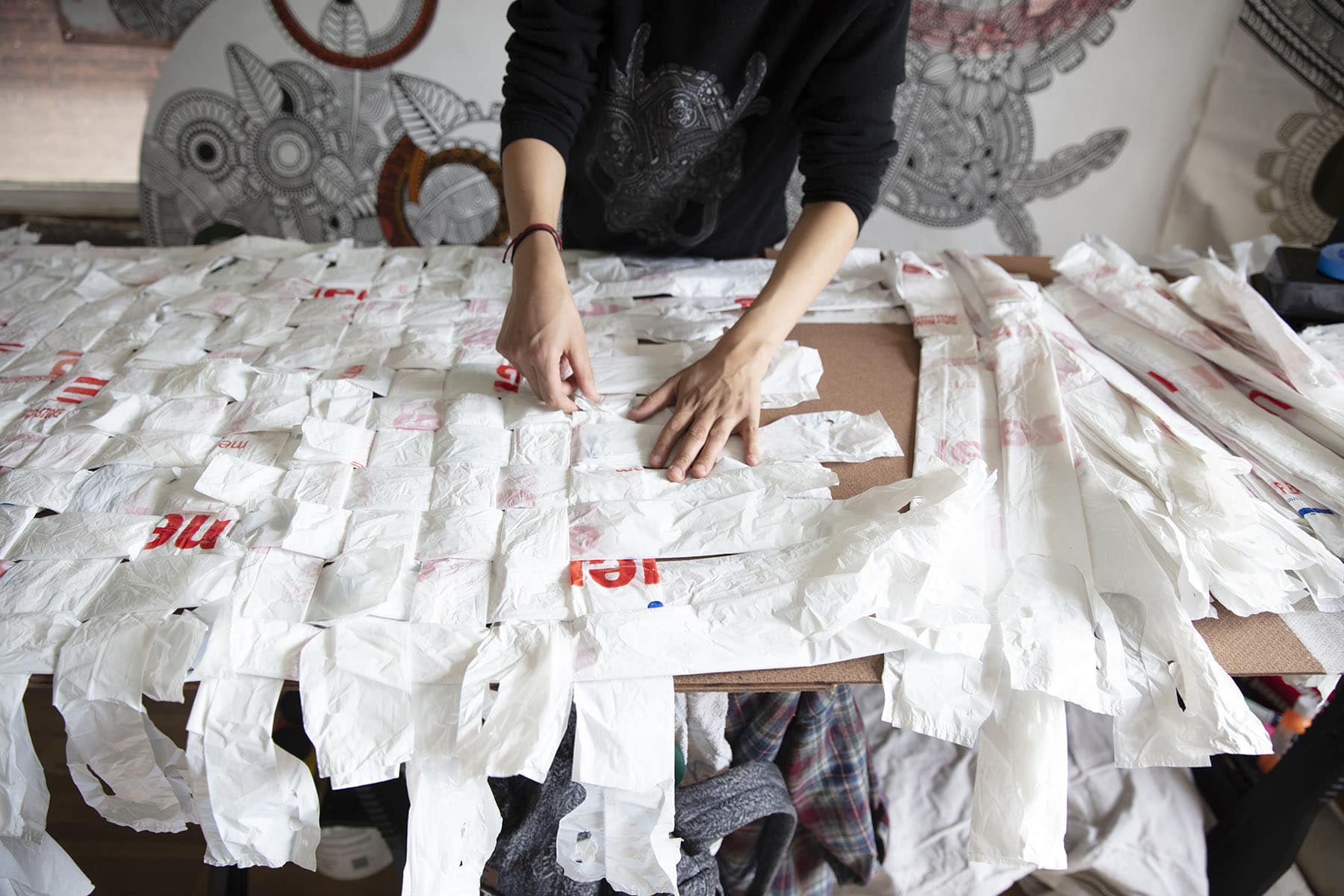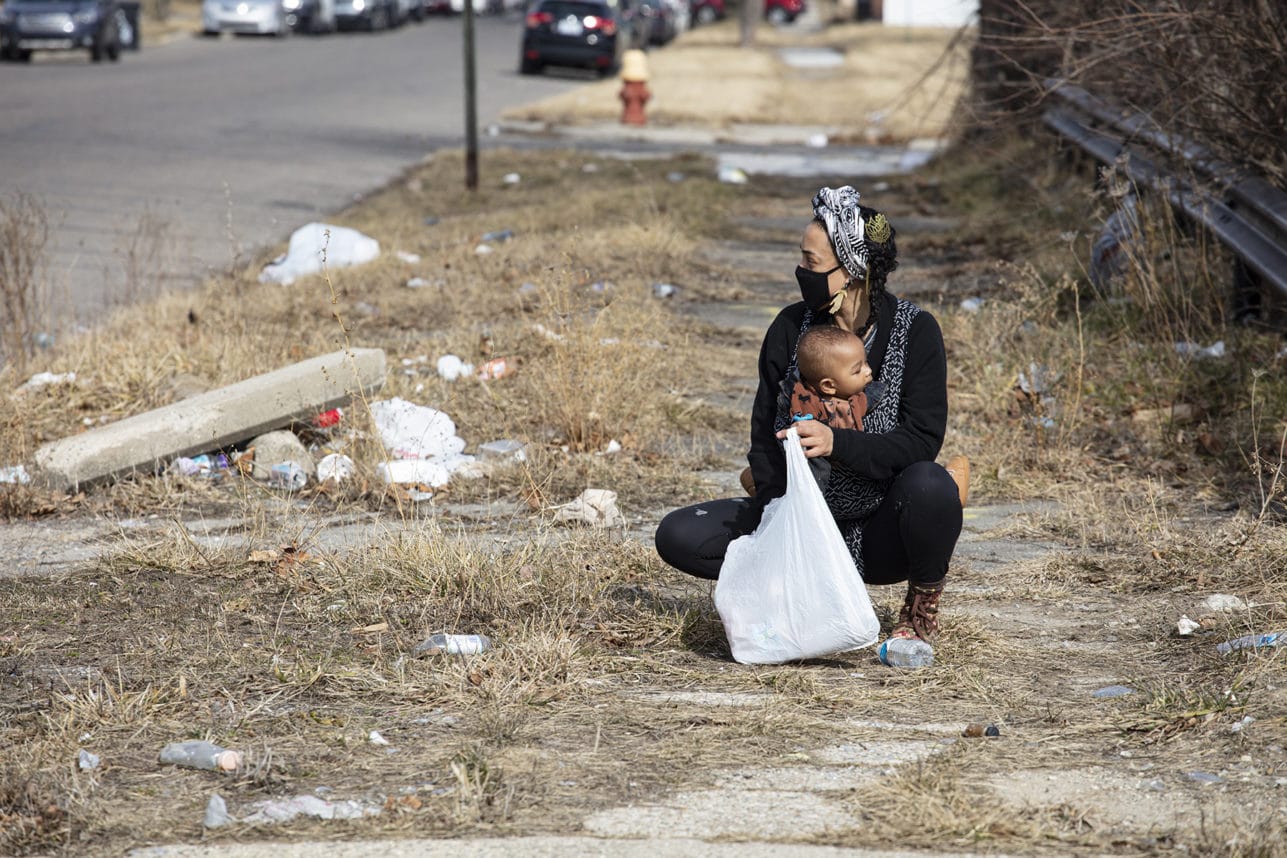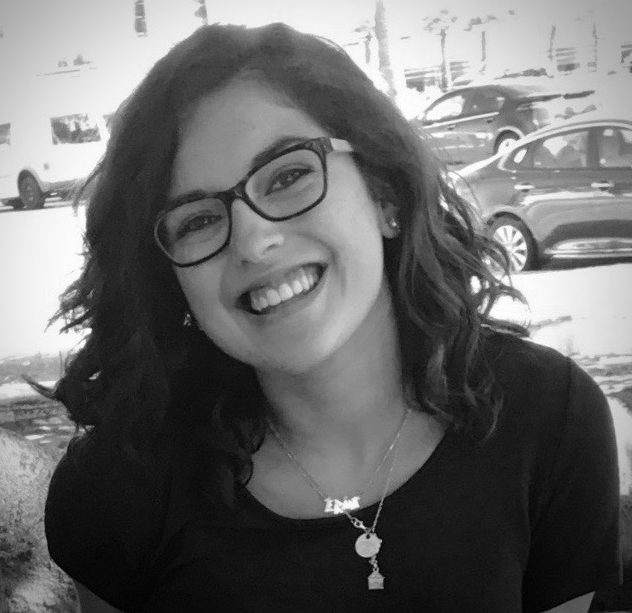 Guterson collected hundreds of single use plastic bags to create a woven tablecloth for her seder table installation titled “At Our Table.” All photos by Sal Rodriguez/courtesy of Reboot
Guterson collected hundreds of single use plastic bags to create a woven tablecloth for her seder table installation titled “At Our Table.” All photos by Sal Rodriguez/courtesy of Reboot Passover is Jonathan Bines’s favorite Jewish holiday, but every year, he wishes it directly tied to Tikkun Olam so Jews could repair the earth, “which is so desperately in need of help.”
Bines, who is an Emmy-nominated comedy writer and part-time environmental activist, teamed up with the arts and culture non-profit Reboot to launch a new initiative that asks Jews to give up single-use plastics for the eight days of Passover. Named Plastover, the initiative adds a contemporary and meaningful approach to the Exodus story.
“My 12-year-old son suggested giving up plastic [this Passover.] I thought this was a terrific idea, and …so the exodus from plastic waste was born,” Bines said. “This project leverages Passover’s power of symbology and transformation to use plastic to spark a sustained climate intervention. An Exodus of a thousand miles begins with a single step. We believe this step of Plastover will set us on a path toward having a real impact.”
Plastic has many important uses, but the over-reliance on it has had disastrous consequences for the health and the wellbeing of the planet and humanity. National Geographic reported in July 2019 that half of all plastics ever manufactured have been made in the last 15 years. “Plastic production has increased exponentially, from 2.3 million tons in 1950 to 448 million tons by 2015,” the 2019 report stated. “Production is expected to double by 2050.”
Bines, along with the Reboot network, wanted to challenge everyone this Passover to take the first step in becoming less reliant on plastics. Just like Jews don’t eat hametz during Passover, Jews will sacrifice plastic bags, straws, candy wrappers, cellophane, bubble wrap or take-out containers during Plastover. Reboot believes reducing plastic use is a moral responsibility and Jewish value as well as a practical necessity.
Jews will sacrifice plastic bags, straws, candy wrappers, cellophane, bubble wrap or take-out containers during Plastover.
As part of the reinterpretation of the holiday, Reboot is reimagining the original 10 Plagues of Egypt. “The 10 Plagues of Plastic” share the tolls that plastic has taken on the world. Correlating with the original 10 plagues (waters of the Nile turning to blood is now the oceans filled with garbage), each plague ends with an action item that all people can do to remove the plastic in their lives.
Once again, because of the pandemic, this Passover will look different than others. Reboot CEO David Katznelson said the pandemic offered another opportunity to modernize Passover rituals and turn them into action-oriented experiences.
“Reboot’s goal is to use our Jewish stories, traditions and rituals to create opportunities for both Jews and their friends to be inspired and connected,” he said. “The idea behind Plastover is a universal idea of understanding an aspect of human environmental damage and thinking about how to change our habits and thus our world. “[Plastover] is a powerful opportunity to take an ancient Jewish tradition and make it relevant for today’s concerns.”
In addition to participating in the plastic-free challenge, Reboot network member and Detroit artist Olivia Guterson is showcasing an art installation at the Museum of Contemporary Art Detroit (MOCAD). The installation, “At Our Table,” will showcase a 20-foot-long seder table dressed to the nines in single-use plastics. The art collaboration is put on through Reboot, the museum and Jewish Funders Network CANVAS.
Guterson, a visual and conceptual artist, is deeply influenced by textures, landscapes, patterns as well as her Jewish and Black heritage. She said she had been “hoarding” plastics for years and during quarantine found herself picking plastic up around her neighborhood. She had hoped the right opportunity would come along where she could use them for a project. She said this project is a wonderful opportunity for her to embrace all aspects of her identity.
“I walk through the world mostly as like ‘other’ or a person of color. I don’t always get to talk about my Jewishness, so I’m really excited to merge those,” Guterson, 30, said.

She also added it isn’t lost on her that communities of color are disproportionally impacted by plastic manufacturing and consumption. From the packaging and marketing of plastics and food items to the actual location of the manufacturing sites, plastic production targets minority and lower income communities at a higher rate. “Even the way plastics [cause] these microplastics that people are breathing in. These are the predisposition conditions that are causing Black and Brown communities to be impacted by COVID-19.”
When the art installation is finished with its run, Guterson is ensuring that it will be recycled properly so that it can be turned into eco-bricks to build garden beds throughout the community. She is partnering with the sustainability non-profit HAZON to set up bins that collect plastic around the community to create more eco-bricks.
“It needs to be full circle… some form of action to get rid of the plastic,” she said. “The Passover table will turn into a garden bed when it’s over…it’s not lost on me that all this stuff was found outside and now it’s going back outside as something elevated to talk about the role of waste and things that are disposable.”
Members of the Detroit Jewish community can view the installation in person safely outside at MOCAD from March 25 through April 5. Others can still experience “At Our Table” and the national CANVAS project “Dwelling in a Time of Plagues” online. The art project allows for new art to be constructed outside during the pandemic. In addition to Detroit, different Passover-related exhibitions are in Baltimore, Boston, Charlotte, New York City and Toronto. Guterson hopes that the call to action will resonate with people because it is presented through art.
“[The installation] is all made from garbage, and it’s damaging our environment,” she said. “Art is a way of providing a platform to having a conversation, a way of educating each other without shaming one another. It’s not always easy just to tell someone, ‘Hey, you need to stop doing that.’ Let me show you that we can do other things, be creative and thrifty. Art gives us the opportunity to see the impact. It’s the vehicle to imagine what is possible.”

Back in Los Angeles, Tarah Malhotra-Feinberg of Eagle Rock has been a member of Reboot since 2010. This Passover, he and his wife are excited to participate in Plastover with their five-year-old twin daughters. He and his family are committed to reducing their waste and think this is a great way to start taking action as a family.
“We’re looking for ways to teach our children about environmental responsibility… how joining movements we believe in can make a significant change collectively. We want to do this in a fun, interactive way,” he said. “We are a pretty secular, interfaith, interracial [and] international family, so we sometimes struggle to find the balance between incorporating religious and cultural traditions without making one of the parents feel like an ‘other’ to the kids. By finding ways to apply the core principles, teachings and stories of these traditions to modern social causes, it makes them palatable, universal and meaningful in ways that are immediately applicable to our lives, and can be understood by five-year-olds.”
Bines wants as many households to participate in this initiative as possible and encourages them to interact on social media using #Plastover. He’s also eager to hear the responses from those who realize how difficult it is to remove plastic from their everyday lives. But that’s also the point.
“We’re not asking people to gather up and throw out everything made of plastic,” he said. “By encouraging individuals to take responsibility, Plastover can help raise awareness about the impact of plastic, the need for change, and the ways in which we are not in control of our own plastic consumption and plastic waste.”
To learn more about the Plastover challenge and how to get involved, visit the website.























 More news and opinions than at a Shabbat dinner, right in your inbox.
More news and opinions than at a Shabbat dinner, right in your inbox.